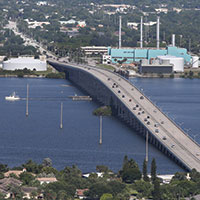 No good news for Vero in Shores’ PSC filing on electric territories
No good news for Vero in Shores’ PSC filing on electric territories
STORY
Vero officials hoping for the Florida Public Service Commission to give them a clear victory when it comes to permanent territorial rights – a win that they could use as ammunition in their legal battle with Indian River Shores – could not have been encouraged to read Shores’ attorney Bruce May’s filing with the PSC last week.
“After the Town filed its lawsuit against the city,” May explained to the PSC, “Indian River County and the City (of Vero Beach) each filed separate petitions for declaratory statements with the commission that could potentially invite the commission to address issues related to the pending litigation.
“Your staff recognized that it would be improper for the commission to provide a declaratory statement that would address issues that are related to currently pending litigation, and cited a number of authorities to support that principle,” May pointed out.
This puts the five political appointees who serve on the PSC in quite a pickle, as all of the state’s major utility companies are hoping the Commission will rule that a city or town does not have the right to change electric providers when it comes time for a new 30-year franchise agreement.
Attorney Robert Scheffel “Schef” Wright said at the last City Council meeting that Vero’s supporters are prepared to argue for permanent territories on Feb. 3 when Indian River County’s matter comes up for consideration in Tallahassee.
May, however, cited a 1987 opinion of Florida’s First District Court of Appeal that held, “We do view it as an abuse of authority for an agency to either permit the use of the declaratory statement process by one party to a controversy as a vehicle for obstructing an opposing party’s pursuit of a judicial remedy, or as a means for obtaining, or attempting to obtain, administrative preemption over legal issues then pending in a court proceeding involving the same parties.”
May, on behalf of the Shores, then tactfully but sternly cautioned the PSC: “The Town hopes that the commission will continue to be guided by this fundamental tenet of administrative law as it considers the petitions filed by the County and the City. In particular, if the commission is inclined to issue declaratory statements in response to the petitions of the County and the City, the Town respectfully requests that it do so carefully and narrowly so as not to prejudge or predetermine any issues in the pending litigation.”
Should the PSC issue a ruling that the Shores’ attorneys feel over-reaches into the particular questions of their lawsuit, the Shores could challenge the commission’s ruling in the appellate court system.
The crux of the Shores legal argument against Vero is that the Town Council, as the elected representatives of a sovereign municipality, has the right to either provide electric service, or temporarily assign that right via a franchise agreement.
The Town believes it entered into a contract for service with Vero in good faith decades ago, but that Vero has not held up its end of the bargain.
“The Town’s lawsuit asserts that the City has imposed unreasonable rates on the Town and its residents, which the City has used to subsidize its own operations and reduce its citizens’ own tax burdens, while not providing the Town a voice in the management of the utility and the use of its revenues,” Mays said in his PSC filing.
The Shores also claims that Vero violated state law by re-calculating its customer count to fall below the 30,000 threshhold set by the Mayfield Bill, which would have required Vero to conduct a referendum on establishing a representative utility authority to run Vero Electric.
The lawsuit between the Shores and Vero is on hold until at least March 2, during which time the County and the Shores are permitted – without fear of being sued by Vero – to begin negotiating with a new power provider, presumably FPL. The Shores’ 30-year franchise agreement with Vero expires at the end of 2016, with the County’s franchise agreement expiring four months later in March 2017.
Vero’s petition before the PSC is scheduled to be heard on March 3, but the PSC’s detailed staff analysis and recommendation – typically a critical factor in the commission’s ultimate ruling – is expected out about 10 days prior to the March 3 hearing.
After the March 2 “options review” period with Vero elapses, the Shores can tell mediator Carlos Alvarez that the Town feels the dispute has reached a formal impasse in its attempts to settle the conflict. At that time, the Shores may re-activate its lawsuit, which has been assigned to Judge Cynthia Cox in the 19th Circuit Court.
The Vero Beach City Council was set to meet its new trial attorney John W. Frost Tuesday and hear his proposed strategy to win the case for Vero.








